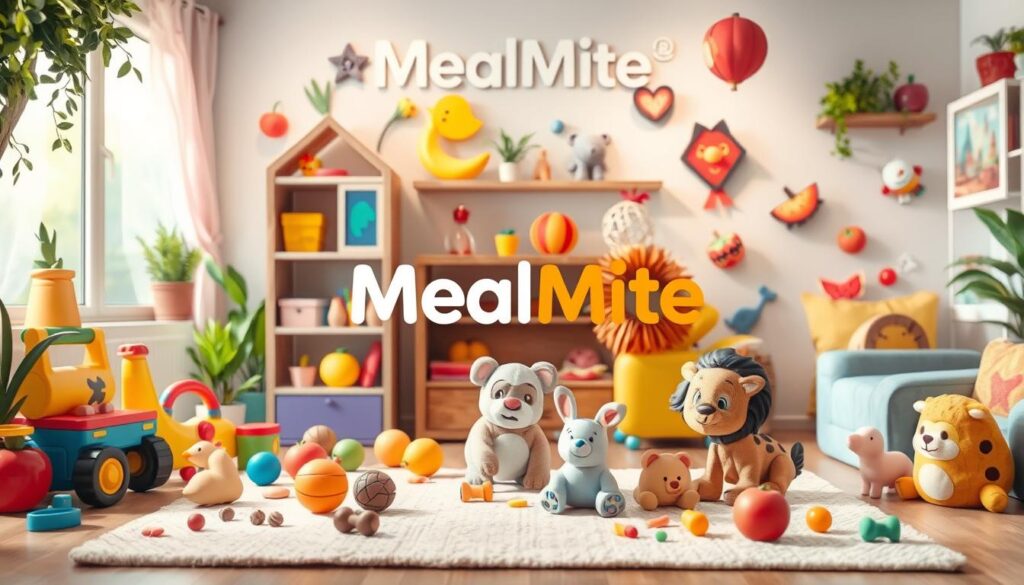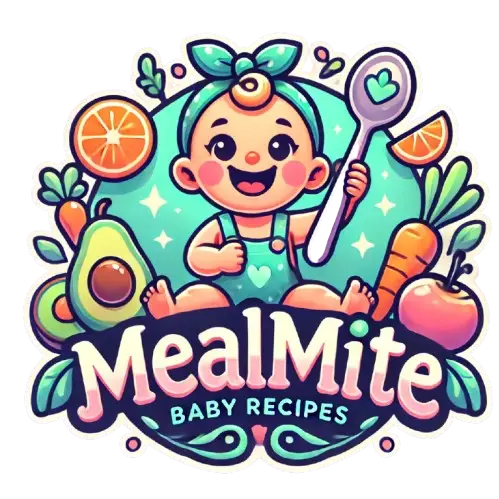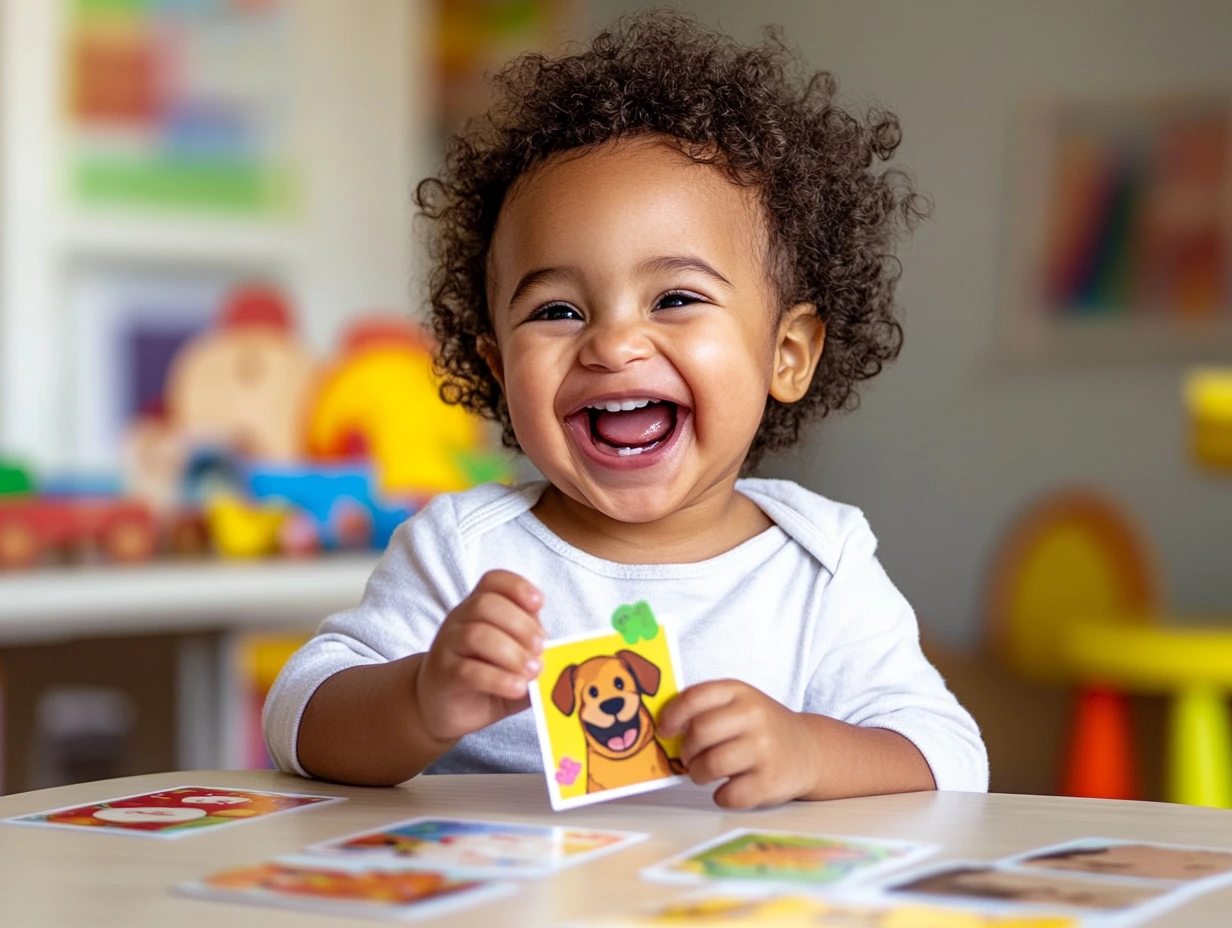Experts say kids should know at least 50 words by 2. The American Academy of Pediatrics (AAP) notes that about 20% of kids have language delays. A detailed list of words for 2-year-olds is key to helping them talk better.
Table of Contents
Studies show that kids who learn new words quickly do better in reading and speaking later. By 2, they can understand over 1,000 words and start saying simple sentences like “more juice” or “big truck.” A good list should have basic words like family names, favorite foods, and common actions.

Key Takeaways
- Children should use at least 50 words by age 2, with a mastery list of around 25 words.
- A detailed 2-year-old vocabulary word list is vital for language growth.
- Kids who learn new words fast tend to do better in reading and speaking later.
- By 2, kids can understand over 1,000 words and start making simple sentences.
- A good list should include basic words like family names, favorite foods, and common actions.
- Language delays affect about 20% of children, and early help leads to better results.
Understanding Your Two-Year-Old’s Language Development
At two years old, kids grow a lot in talking. They learn new words and start making simple sentences. Studies show that using words in different ways helps kids learn better. Dr. Leslie Rescorla found the top 25 words toddlers learn, like basic nouns and verbs.
Words and phrases are key for young kids to talk. By two, a child should know about 50-70 words. They start to say two- or three-word sentences. It’s important to watch how a child talks and get help if needed. Two-year-olds might say things like “more milk” and “mama go”.
Knowing what’s normal in a child’s vocabulary is important for parents. Kids might not understand adjectives well but can say “big” and “little”. They can follow simple directions and start to have two-sided conversations. Reading to toddlers helps a lot with their language skills.
Key Developmental Milestones
- Understanding more words than they can speak at 12-15 months
- Speaking around 10 single words at 12-15 months
- Speaking at least 20 single words correctly at 15-18 months
- Understanding between 200 to 500 words at 18 months to 2 years old
By knowing these milestones, parents can help their child’s language skills. Using early childhood words and preschooler vocabulary is key. It helps kids build a strong base for talking in the future.
The Science Behind Early Vocabulary Development
Learning words is key for toddlers to grow their language skills. Studies show kids learn action words better when they see and hear them in different situations. This makes it vital to create a rich language environment for them.
A children’s word list is a great tool for growing vocabulary. By introducing kids to many words, parents and caregivers help lay a strong language foundation. This can boost their thinking skills and help them do well in school later on.
Research points out a big gap in vocabulary between rich and poor kids by 3 years old. This gap shows how important it is for parents and caregivers to focus on teaching vocabulary early on.
| Age | Vocabulary Size |
|---|---|
| 1 year | 50 words |
| 3 years | 1,000 words |
| 5 years | 10,000 words |
Knowing how vocabulary grows early on helps parents and caregivers support kids’ language skills. Using a beginner word list and a children’s word list can make a big difference in toddlers’ vocabulary.
Comprehensive 2-Year-Old Vocabulary Word List
Parents and caregivers need a 2-year-old vocabulary word list to track their child’s language growth. Experts say starting with common action words is key. A 2-year-old should know about 50-70 words, with half of them clear to strangers.
Studies show talking and using descriptive words help toddlers learn more words. Reading to them often boosts their word recall and understanding. Seeing different things, like colorful books and nature, also allows their vocabulary grow.
Essential Action Words
- Run
- Jump
- Eat
- Drink
- Play
Important Nouns
- Mom
- Dad
- Ball
- Toy
- Book

By age 2, kids should know about 200 to 300 words. They should be able to say about half of these words to people they don’t know. Basic words like big, small, happy, and sad are important. So are social words like “hi,” “thank you,” and “please.”
Using a toddler word list helps spot where a child might need help. Learning new words is key for their brain growth. By using a detailed 2-year-old vocabulary list, parents can help their child build a strong language base for school and beyond.
Creating a Language-Rich Environment at Home
Creating a language-rich home is key for kids’ vocabulary growth. Parents can help by talking, reading, and singing with their kids. It’s important for kids to hear new words often and in different ways.
Talking to kids every day boosts their vocabulary. Reading together is also essential. Letting kids pick books they love helps them learn new words. Here are some ways to make your home a language hub:
- Having storybooks in each room
- Labeling household items to connect words with their meanings
- Using magnetic letters for interactive letter play
- Involvement in writing activities, including creating grocery lists or menus with children
Singing and reading poetry can improve kids’ language skills. Talking at meals helps kids practice listening and speaking. By making your home a language-rich place, you help your kids build a strong vocabulary. This will help them succeed in school and life.
| Activity | Benefits |
|---|---|
| Reading books | Enhances vocabulary development and comprehension |
| Singing songs | Boosts language rhythm and phonetic understanding |
| Conversational interactions | Encourages vocabulary growth and social language skills |
Daily Activities to Boost Vocabulary Growth
Doing daily activities with toddlers can help them learn new words. Parents can make a list of easy words and use them during meals, play, and bedtime. Talking with their kids during these times helps them learn and grow.
Studies show that learning a few new words each week helps kids remember them better. Parents can plan out which words to teach each week. For example, at meals, they can point out different foods and say their names.
Mealtime Learning Opportunities
Mealtime is a great chance to teach new words. Parents can teach their kids the names of foods, drinks, and things they use. Making learning fun during meals helps kids enjoy learning.
Playtime Vocabulary Building
Playtime is also key for learning new words. Parents can play with their kids and name different toys and actions. This interactive way helps kids learn and grow their vocabulary.
Bedtime Language Routines
Bedtime is another good time to teach new words. Reading books together is a great way to do this. Parents can point out characters and objects in the stories.
By making learning part of daily life, parents help their kids get ready for more language skills. Using simple word lists makes learning fun and helps their vocabulary grow.
| Activity | Vocabulary Building Opportunities |
|---|---|
| Mealtime | Names of foods, drinks, and utensils |
| Playtime | Names of toys, actions, and objects |
| Bedtime | Characters, objects, and actions in books |
Common Challenges in Vocabulary Development
Children may face challenges when growing their vocabulary. The American Academy of Pediatrics (AAP) says about 1 in 5 kids have language delays. A 2-year-old vocabulary word list helps parents spot issues and track progress. Challenges include language delays, hearing problems, and not enough language exposure.
A toddler word list is great for parents to watch their child’s word growth. By 24 months, kids usually say 200-300 words. But, some might have trouble with language.

Parents can help by making a language-rich home and doing activities that boost vocabulary. A vocabulary for 2-year-olds should have many types of words. Knowing common challenges and supporting language development helps kids overcome hurdles and build a strong communication base.
The Role of Reading in Building Vocabulary
Reading is key in growing vocabulary, and introducing kids to new words and situations. This is true for early learning words, which are vital for young children. By age 4, kids know about 1,500 words. By age 6, they know around 3,000 words, showing how fast they learn language in their early years.
Reading boosts vocabulary in preschoolers, as books have rare words. It’s important to pick books that match a child’s age and interests. For example, kids often love books about dinosaurs, showing their interest in complex words.
Choosing Age-Appropriate Books
Choosing the right books for preschoolers is critical. Look for books with simple text and fun pictures. These can help build vocabulary and spark a love for reading. Some good examples include:
- Board books with simple textures and images
- Picture books with engaging storylines and vocabulary
- Early reader books with simple sentences and repetition
Interactive Reading Techniques
Interactive reading methods, like reading aloud and asking questions, help kids grow their vocabulary. Making reading fun can help kids love learning and reading. Parents and caregivers play a big role in this.
Technology and Vocabulary Learning
Technology can help toddlers learn new words in fun ways. Apps and programs make learning interactive and engaging. For instance, PBS Kids and ABCmouse have games and activities that boost vocabulary skills.
It’s important to follow screen time rules when using technology for learning. The American Academy of Pediatrics suggests 1 hour a day of educational content for kids aged 2-5. This time can be used for reading e-books or playing educational games that focus on vocabulary.
Some great apps and programs for learning vocabulary include:
- Endless Alphabet: an interactive app that teaches children the alphabet and expands their vocabulary
- Reading Eggs: a reading program that provides interactive lessons and games to help children develop their reading and vocabulary skills
- Toca Life: a series of apps that offer interactive games and activities that can help children develop their vocabulary and social skills
Using technology wisely can help toddlers build a strong vocabulary. This sets them up for success in school and beyond.
| App/Program | Description | Age Range |
|---|---|---|
| Endless Alphabet | Interactive app that teaches the alphabet and expands vocabulary | 2-5 years |
| Reading Eggs | Reading program that provides interactive lessons and games | 2-7 years |
| Toca Life | Series of apps that offer interactive games and activities | 2-9 years |
Social Interactions and Word Learning
Social interactions are key to learning new words. They offer chances to talk and grow vocabulary. A 2-year-old’s vocabulary word list gets better when parents talk with their kids. For example, at meals, ask your child to name foods like “What’s this?” or “Can you give me the apple?”
Engaging in social activities helps a toddler word list grow. Parents can teach new words in daily life. By 18 months, kids start using vocabulary for 2-year-olds to talk. By 2 years, they can say 2-3 words, like names and some actions.
Here are ways to boost word learning through social interactions:
- Reading books together and talking about the story and characters
- Singing songs and reciting nursery rhymes to teach new words and phrases
- Playing games that involve taking turns and using vocabulary to communicate
By doing these activities, parents help their kids build a strong 2-year-old vocabulary word list. Remember, social interactions are vital for learning new words. Parents are key in helping their child’s language grow.
When to Seek Professional Help
As a parent, it’s normal to worry about your child’s language skills. If you’re concerned about their kids vocabulary words or early childhood words, getting professional help is key. Look out for signs like language delays, hearing issues, and not being exposed to language.
By 2 years old, kids should know at least 100 words. By 3, they should know 300 to 500 words. If your child isn’t hitting these marks, it could mean a speech or language delay. A speech-language pathologist can check your child’s preschooler vocabulary and help you support their language growth.
Signs of a speech delay in 2-year-olds include not talking, not combining words, and trouble understanding. If you’re worried about your child’s language, don’t wait to get help. Early action can greatly improve their communication skills.
| Age | Vocabulary Milestones |
|---|---|
| 12-17 months | Say two to three words to label a person or object |
| 18-23 months | Use around 50 words, though pronunciation is often unclear |
| 2 years | Use at least 100 words |
| 3 years | Use 300 to 500 words |
Every child grows at their own pace, but it’s best to get professional advice if you’re worried. With the right support, your child can build a strong base in kids vocabulary words and early childhood words. This will help them succeed in school and life.
Supporting Multilingual Development
Research shows that supporting multilingual development in kids can greatly boost their vocabulary development for toddlers. Parents can help by talking with their kids in different languages and making their surroundings language-rich. This can include making a beginner word list to teach new words in various languages.
A children’s word list is a great tool for supporting multilingual growth. Parents can use it to introduce familiar words and new ones in different languages, helping kids expand their vocabulary and improve their speaking.
Here are some tips for supporting multilingual development:
- Engage in conversations with kids in different languages.
- Provide environments rich in language to expose kids to various languages.
- Create a beginner word list to teach new words in different languages.
By following these tips, parents can help their kids develop a strong foundation in multiple languages.
| Language | Vocabulary Development |
|---|---|
| English | Introduce new words daily to increase vocabulary by 365 words per year |
| Spanish | Use visual aids to teach new words and phrases |
| French | Engage in conversational interactions to improve language skills |
Conclusion: Nurturing Your Child’s Communication Journey
Helping your child grow their communication skills is key. As parents, we are important in this process. We can do this by talking to them, reading books, and making our homes language-rich.
By adding vocabulary-building activities to our daily lives, we help our 2-year-olds learn more words. This boosts their ability to communicate.
It’s important to expose our children to many 2-year-old vocabulary words and give them chances to talk to others. Whether it’s at meals, playtime, or bedtime, these moments are great for learning new words.
With patience and dedication, we can help our children succeed in learning new words. This sets them up for success in school and social skills.
FAQ
What is the importance of vocabulary development in 2-year-olds?
Vocabulary development is key for 2-year-olds. It helps them communicate better. They can share their thoughts and feelings more clearly.
What are the typical language development milestones for a 2-year-old?
By 2, kids usually know 150 to 300 words. They start making simple sentences. They also use more action words and talk more.
What is the role of action words and conversational interactions in a 2-year-old’s vocabulary development?
Action words and talking help a lot. They teach kids new words and how to use them. This helps them learn and grow.
What are the common words that 2-year-olds typically master?
Leslie Rescorla, PhD, found out what 2-year-olds usually learn. They get better at using nouns, action words, and words for social talk.
How can parents create a language-rich environment at home to promote vocabulary development?
Parents can create a language-rich home by talking to their children, reading books, and singing songs. These activities help them learn many words.
What are some daily activities that can boost a 2-year-old’s vocabulary growth?
Mealtime, playtime, and bedtime routines help a lot. They also allow parents to teach new words in daily life.
What are common challenges in 2-year-old vocabulary development, and how can they be addressed?
Some kids might have trouble with words. This could be because of delays, hearing issues, or not enough talk. Get help, make a talky home, and do activities that help with words.
How can reading help build a 2-year-old’s vocabulary?
Reading books that fit their age is very helpful. Talking about the books teaches them new words and their meanings.
What is the role of technology in 2-year-old vocabulary learning, and how can it be balanced?
Technology, like apps, can help with learning words. But it’s important not to overdo it. Set limits and choose good content to help with learning.
How do social interactions contribute to a 2-year-old’s word learning?
Talking and doing things together is very important. It lets kids hear and use new words in real ways.
When should parents seek professional help for their 2-year-old’s vocabulary development, and what resources are available?
If you worry about your child’s words, get help. Speech therapists and early programs can help. They offer advice and support for learning words.
How can parents support multilingual development in their 2-year-old?
To help with learning many languages, make a talky home in all languages. Talk and read in each language to help them grow.


1 thought on “Essential 2-Year-Old Vocabulary Word List: Improve Your Child’s Communication”